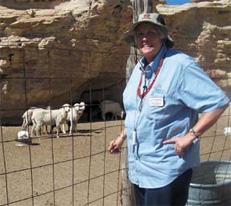Navajo Native Americans consider the “Spider Woman” as sacred as Catholics consider Mary, the mother of Christ. The Navajos’ economy depends primarily on sheep and the wool they produce. Navajo spiritual beliefs embrace the Spider Woman as the one who taught the elders how to weave wool.
 |
| During a Heifer tour of the Navajo nations in July, Mary Ridgway learned that the gift of a sheep brings hope. |
It’s one of the many cultural traditions Mary Ridgway observed on a July 2005 tour of the Navajo nations in the southwestern United States.
Dr. Ridgway’s journey began with an interest in ending world hunger. It led her to discover more about Heifer Project International, a 60-year-old organization that helps communities combat poverty and gain self-sufficiency.
With the motto “Ending Hunger, Caring for the Earth,” Heifer works with 75 North American projects, including three education centers. The centers provide hands-on experiences for adults and children concerning solutions to world hunger. Participants learn what components a community needs for survival and then growth.
“For sustainable solutions to hunger and poverty, there is a need for collaboration, not confrontation,” said Ridgway, executive director of UT Arlington’s Center for Community Service Learning.
Sixteen U.S. participants traveled to four areas within the Navajo nations. Ridgway participated in Heifer’s first North America program study tour to the Navajo nations and attended a mini-Heifer University program on educational opportunities in the field and issues that impact the work.
Preserving the Navajos’ traditional customs is essential to their wool-based economy. The sheep industry—vital to both the Navajos’ economic future and spiritual well-being—has deteriorated because of overgrazing and inbreeding. Poor sheep quality presents a continuing problem, so Heifer has introduced purebred sheep into the Navajo herds to improve wool quality.
The Navajo area is roughly the size of West Virginia with a population of 250,000. More than 57 percent live below the poverty level. With proper education and top-quality wool, a profitable market perhaps could be developed and the Navajo tradition of weaving could again take its place of honor in the culture.
Another tradition focuses on personal growth. Navajos place significance on stages of life, such as a child’s first laugh as well as the person who inspired the laugh. That person becomes responsible for hosting a dinner in the child’s honor.
“Along every step of my sojourn, I learned invaluable lessons about restoring harmony within myself, with others, with Mother Earth and Father Sky,” Ridgway said. “They call it hozho.”
She observed how the Heifer project involved cattle and flock management as well as permaculture training and planting of native vegetables. It included teaching the Navajos about animal health and nutrition. Much of the reservation land has eroded, and the soil has lost nutrients. The project provided training on recapturing these elements.
Many people became more aware of the Navajos through a recent movie, Windtalkers. Ridgway’s tour included a meeting with Thomas Begay, one of the Navajo Code Talkers who inspired the movie. The Code Talkers used a complex code based on an unwritten Navajo language to transmit messages during World War II.
This code prevented the Japanese from deciphering American strategic communications. Begay, a veteran and tribal elder, said 3,600 Navajos served in the military during the war and returned home to find resources depleted and jobs few. Unemployment continues to be a major problem.
Overcoming poverty and hunger requires a multifaceted approach. Leadership development, marketing skills, business planning and veterinary training are among other areas that Heifer addresses. To further illustrate how individuals can combat world hunger, the study tour group witnessed a ceremony called “Passing on the Gift.” A Heifer cornerstone project, it calls for Navajo first-ewe recipients to pass on lambs to other families.
Ridgway visited Tim and Belinda Johnson, a Navajo family. Tim is president of the Kéyah Be lina Heifer Project located at Rocky Ridge in Navajo, Ariz. He is an activist working for culture preservation, and he also fights Navajo relocation. Tim, Belinda and their four children live without electricity; they walk a half-mile uphill to collect water.
The family honored the guests by butchering a sheep for dinner. Every part of the animal was used. The meal consisted of mutton ribs, mutton soup, Navajo fry bread and tacos.
“My journey to the Navajo nation allowed me to see firsthand how the gift of a sheep brings hope, dignity and self-reliance to indigenous people who struggle to preserve their culture, traditions and language,” Ridgway said.
One of the enduring lessons she learned was that throwing money at a problem or providing quick fixes or handouts doesn’t yield sustainable solutions. Giving responsibility back to the people is important to help them improve their lives.
Ridgway said her time with the Navajos inspired a change in her focus from one that blocks inner peace to one that provides harmony and balance. She hopes her experience will motivate UT Arlington students, staff and faculty to take a similar journey.
“Being on Navajo time helped me rediscover a rhythm, simplicity and harmony I have not experienced since I was a child,” she said. “It forced me to ask myself, ‘Is what I am doing consistent with my own deep need to feel that my life counts?’ ”
— Kim Pewitt-Jones
| Archives
| Alumni Association |
Giving to UTA | UTA
Home Copyright © 2006 UTA Magazine. All rights reserved. |
